Part - I
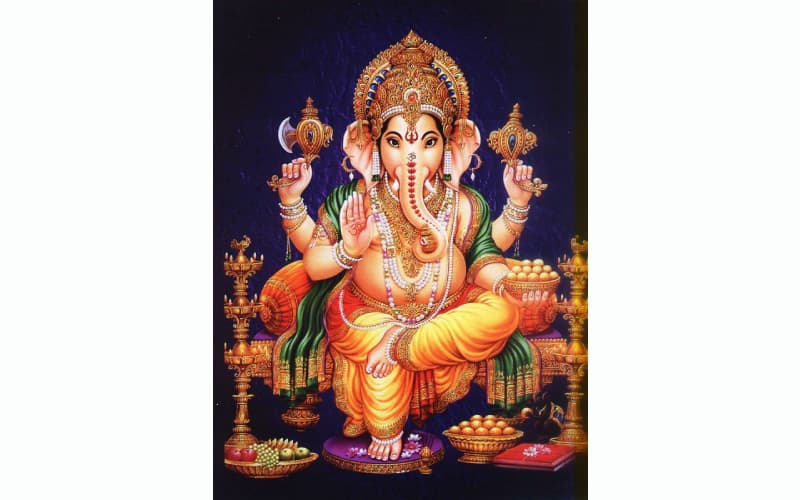
The mind easily grasps all the gross forms. While it becomes difficult for it to associate abstract concepts i.e. which cannot be perceived through our senses. Such subtle forms are generally misinterpreted by the senses. It associates the formless beauty with things, formless emotions to people, and formless states to situations. This technical error of the mind was exploited by our Rishis for the benefit of the humankind. They started to worship the formless God with numerous forms. The manifold names and forms reflected the qualities of the formless God.
Lord Vignesha is the primal God in Hindu culture. Every occasion begins with the worship of the Lord. The different names of Lord Ganesha recited in archanai signifies the unique characters and features of the Lord. Here, we have the meanings to 16 names of the Lord recited in archanai during almost all rituals,
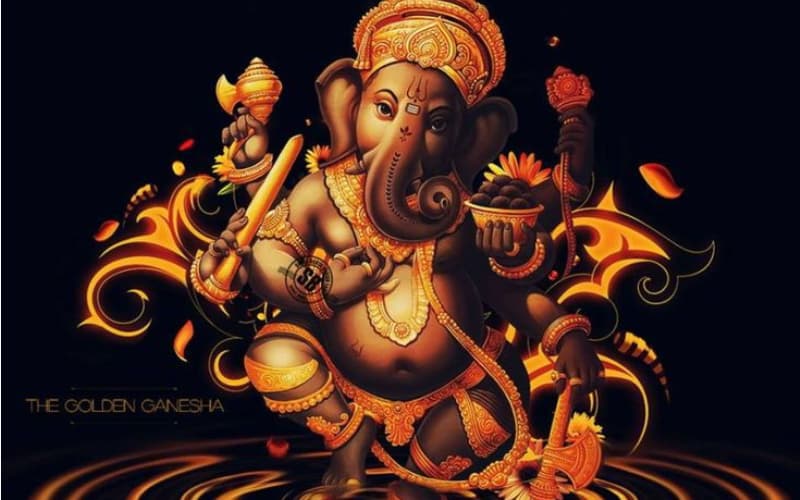
1. Oṁ Sumukhāya Namaḥ – Salutations to the one who has pleasant face!
Explanation: As the proverb goes, “Face is the index of the mind”, face reflects the state of mind. One can find out whether the other person is happy or agitated by closely observing his/her face. Here, Lord Vinayaka is said to have a pleasing face which shows his calm mind. This salutation also indirectly means that one who prays to the Lord will also be blessed with a calm and a positive mind.
2. Oṁ Ekadantāya Namaḥ – Salutations to the one who single tusk!
Explanation: All these archanai-s not only mean the different names and features of Lord Vinayaka, but also profound meaning embedded in them. When anyone says ‘Ekadanta’, one is sure to be reminded of the story of how Mahabharatha was narrated by Vyasa to his scribe Lord Vinayaka. Lord Vinayaka was so sincere at his work that when no ink was left to continue his task, he broke his tusk to keep up the good work of writing it. That is why, we now have the epic, Mahabharatha.
This archanai particularly means his selfless devotion to work. It teaches us how sincere we should be at the work so that our work is transformed into an act of prayer. Apart from the literal meaning, it also opines that Lord Vinayaka is the bestower of the quality, of being sincere at work.
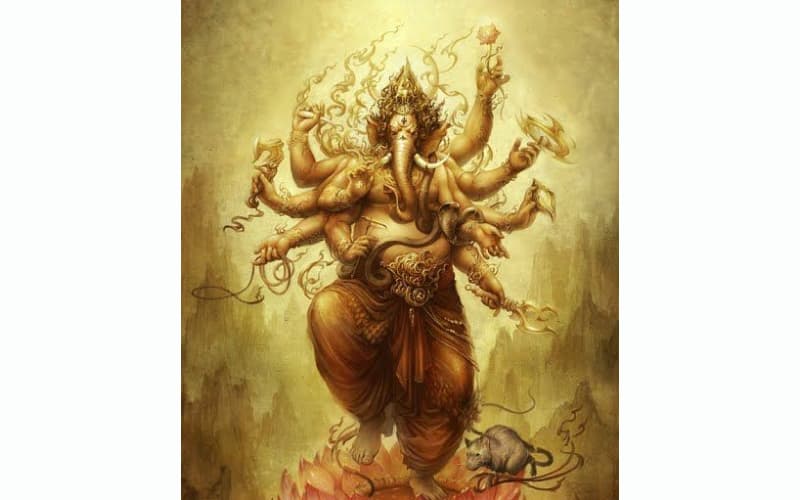
3. Oṁ Kapilāya Namaḥ – Salutations to the one who is tawny in color!
Explanation: This refers to His brightness and equanimity representing that of Lord Aditya (The Sun God). Traditionally, luminosity & poise are associated with the Satvik guna. It is said in the scriptures that the goal in life is to become a Satvik guna predominant person. Therefore, this archanai indirectly means, we pray to that Lord who shall bless us to become more composed and Satvik people.
4. Oṁ Gajakarṇakāya Namaḥ – Salutations to the one has the ears of an elephant!
Explanation: When we talk something to others, we think no one has heard it except the person we are talking to. Physically, there may be no one hiding behind the screen to hear your talk. We can never conclude that no one is hearing just because no one is visible.
Similarly, we may casually think improper thoughts assuming that no one can perceive our thoughts. However, we must constantly remind ourselves that there’s some divine power that is beyond the perception of our body-mind-sense complex, who is omni-present and ever witnessing everything.
In this Naamaavali, Lord Vinayaka is represented with big ears which indirectly means that he is always witnessing all our words and thoughts. Salutes to Him, that big eared one, Lord Vinayaka. Let us pray to Him to bless us with good thoughts, which will help us to speak good words.
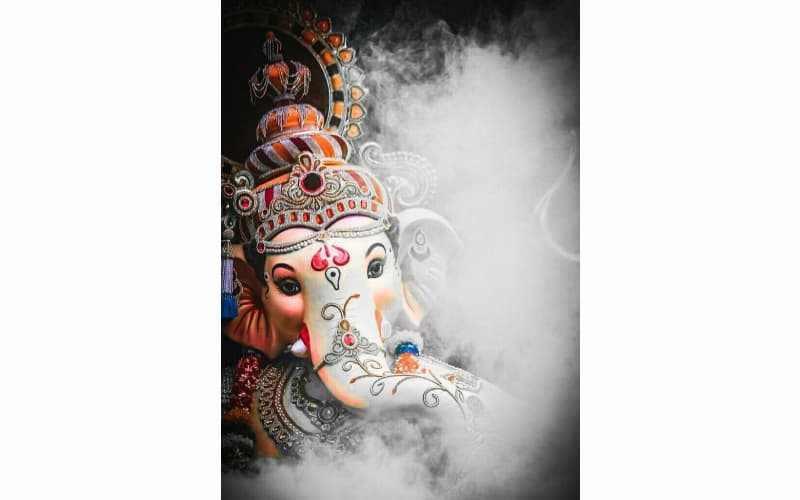
5. Oṁ Lambodarāya Namaḥ – Salutations to the one who has a huge belly!
Explanation: Stomach is an important part which helps us to digest food. Here the Supreme Self, Lord Vinayaka is represented with a huge belly which means that he can stomach any problems. Generally, we say ‘to stomach problems’ or ‘I cannot digest those words’ etc. Lord Vinayaka gives us that mental grit to face and accept anything. This naamaavali indirectly means, to that Lord Vinayaka I pray.
6. Oṁ Vikaṭāya Namaḥ – Salutations to the one who is unusually big and handsome!
Explanation: Our minds tend to equate size with strength and power and surrender to that which is relatively handsome & powerful. Exploiting this trait of mind, our rishis had given Lord Vinayaka the big and the unusually handsome form. So that everyone can surrender their minds at the feet of the Lord and focus on their work. Thus, salutes to the One, Lord Ganesha.
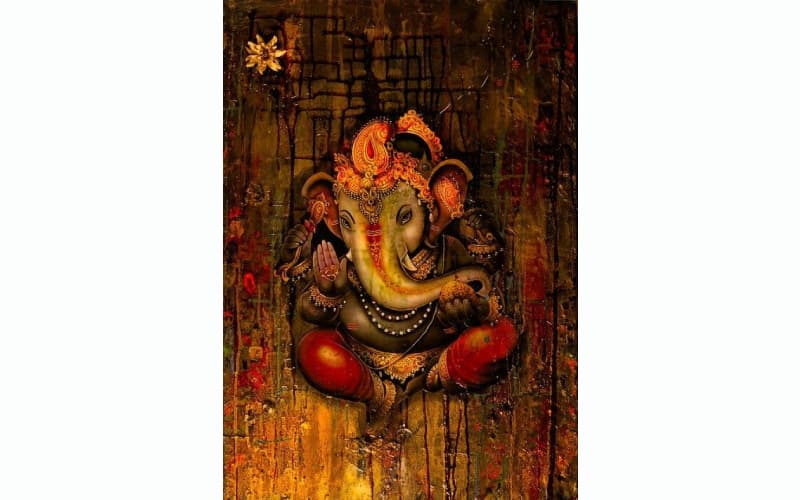
7. Oṁ Vighnarājāya Namaḥ – Salutations to the one who wards off obstacles!
Explanation: Lord Vinayaka is the Vighna Hara (one who wards off obstacles) and the Vighna Karta (one who creates obstacles). So, he is considered to be the Vighnaraja – the king of Vighna-s. This naamaavali indirectly means that one who sincerely prays to the Lord gets the strength and courage to face all problems.
8. Oṁ Vināyakāya Namaḥ – Salutations to the Guru who removes all papas!
Explanation: Guru means the one who removes our ignorance as well as papas of ourselves. Papas are done because of Avidya or ignorance and it can be purged only with knowledge. It is believed from ages hence that Lord Vinayaka is the greatest Gnanadhata, bestower of knowledge. Every child born in Sanata Dharma from an early age is taught to worship Lord Vinayaka at first because he is the universal guru. Salutations to that Guru who shall bless us with Gnana and remove all papas.
(… to be continued)
NEXT ARTICLE